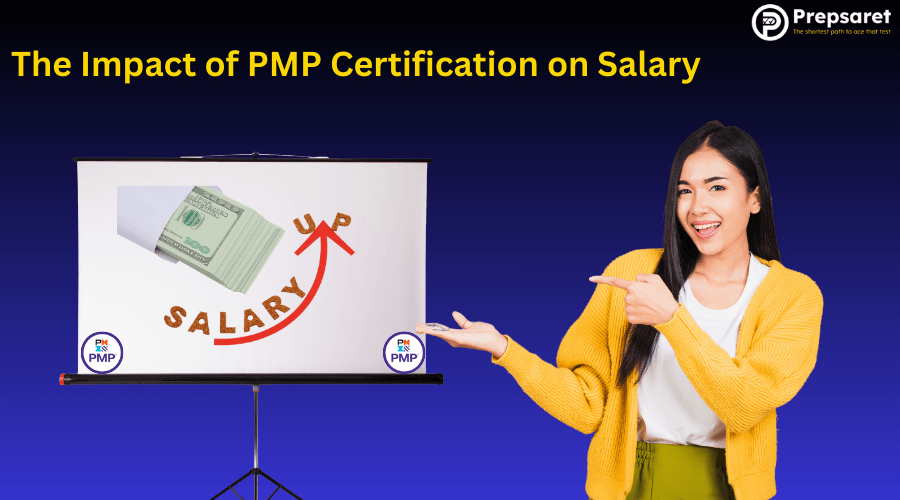Are you wondering if getting a PMP certification is worth your time and money? You’re not alone! Many professionals in project management ask themselves this question. The good news is that a PMP certification salary is often significantly higher than what non-certified project managers earn.
Before we dive in, if you’re looking to prepare for your PMP exam, Prepsaret offers some of the best PMP study materials that will help you pass your exam the first time!
Let’s explore how this valuable credential can boost your earning potential and open doors to exciting opportunities.
What is PMP Certification and Why Does it Matter?
The Project Management Professional (PMP) certification, offered by the Project Management Institute (PMI), is a globally recognized credential that confirms your ability to manage projects effectively as a project management professional.
It equips you with advanced skills for project management roles, covering methodologies like predictive, agile, and hybrid approaches.
Importance of PMP Certification
- Higher Salaries: PMP-certified professionals earn up to 33% more than non-certified peers, with median salaries reaching $123,000 annually.
- Career Growth: As a PMP certification holder, you gain access to better opportunities in industries like IT, construction, and healthcare.
- Global Recognition: Employers value PMP certification for its alignment with international standards and its ability to improve project outcomes.
PMP certification enhances your project management career, providing credibility, networking opportunities, and the skills needed to lead complex projects successfully.
The Impact of PMP Certification on Salary

The PMP certification salary difference is substantial. In the U.S., PMP-certified professionals earn a median annual salary of $120,000, compared to $93,000 for non-certified project managers—a 29% increase.
Globally, PMP holders earn significantly more, with salaries ranging from $80,000 to over $150,000 annually, depending on experience and industry.
This is significantly higher than the average salary for project managers without certification.
The PMP salary advantage is clear when you look at the numbers. Most PMP certified professionals enjoy an annual salary that’s 20-25% higher than their non-certified counterparts.
The latest salary survey from PMI indicates that certification can lead to a salary increase of up to $25,000 annually in some cases!
Here’s a quick breakdown of what you might expect:
- Entry-level PMP certified professionals: $85,000 – $100,000
- Mid-level professionals with 5+ years experience: $115,000 – $135,000
- Senior-level professionals with 10+ years experience: $135,000 – $170,000+
How Non-Certified Project Managers Compare
The difference in earning potential between non-certified project managers and PMP holders is quite eye-opening.
While non-certified professionals can certainly succeed in project management, the certification often accelerates career advancement and salary growth.
On average, non-certified project managers earn about 15-20% less than their certified peers. The pay gap tends to widen with experience, as PMP holders are often prioritized for promotions and leadership roles.
Some key differences include:
- Non-certified project managers typically start at $65,000 – $85,000
- Advancement opportunities may be more limited without certification
- PMP holders often reach senior positions faster
- The salary ceiling is generally higher for certified professionals
Find Out: How to Get PMP Certified
Key PMP Salary Factors

Several key factors influence how much you can earn with your PMP certification. Understanding these can help you maximize your earning potential:
- Education: Having a four-year degree is typically the minimum expectation, but professionals with a master’s degree often command higher salaries.
- Experience: Your years of project management experience significantly impact your earning potential. PMP holders with 10+ years of experience earn substantially more than those just starting out.
- Industry: Some sectors value PMP certification more highly than others, with technology, healthcare, and construction offering premium median salary figures.
- Location: Geographic location plays a major role in determining PMP certification salary levels.
- Company size: Larger organizations typically offer higher compensation packages.
The good news is that project managers with PMP certification are in high demand across nearly all industries, highlighting the growing importance of project management skills.
This high demand gives you strong negotiating power when discussing compensation, allowing you to secure better salaries and benefits.
How to Maximize Your PMP Salary Potential
To maximize your earning potential with a PMP certification, consider the following strategies:
- Negotiate for Performance-Based Incentives: Request cash incentives tied to project success or milestones alongside your base salary.
- Research Industry Standards: Understand typical compensation packages, including other cash incentives, to negotiate effectively.
- Focus on Total Compensation: Evaluate benefits, bonuses, and perks in addition to your salary to maximize your overall package.
- Highlight Your Value: Demonstrate to employers how your PMP certification contributes to successful projects and organizational goals.
- Stay Updated: Regularly update your skills and engage in professional networks to emphasize the importance of your certification in delivering results.
By leveraging these strategies, you can ensure your PMP certification translates into higher salaries, better career opportunities, and long-term financial rewards.
Many certified professionals find that regularly updating their skills and staying active in professional networks helps them command even higher salaries over time.
Related: How To Prepare For The PMP Exam
What Is the Average PMP Salary by State
Your location significantly impacts your earning potential as a PMP certified professional. Here’s a breakdown of annual salary figures by state:
| State | Annual Salary | Monthly Pay | Median Salary |
| California (San Francisco) | $145,103 | $12,091 | $120,000 |
| Washington, DC | $148,626 | $12,385 | $125,000 |
| New York | $130,000 | $10,833 | $115,000 |
| Texas | $125,000 | $10,417 | $110,000 |
| Massachusetts | $142,790 | $11,899 | $120,000 |
| New Jersey | $131,413 | $10,951 | $115,000 |
| Colorado | $100,550 | $8,379 | $95,000 |
| Georgia (Atlanta) | $160,000 | $13,333 | $120,000 |
| Virginia (Arlington) | $180,000 | $15,000 | $125,000 |
| Illinois (Chicago) | $110,000 | $9,167 | $100,000 |
As you can see, locations like San Francisco offer premium compensation for PMP certified professionals, largely due to the high concentration of tech companies and higher cost of living.
Industry-Specific PMP Salaries: Where Do PMP Professionals Earn the Most?
Your choice of industry can significantly impact your PMP certification salary. Some industries consistently offer the highest median salaries for certified professionals.
| Industry | Average Annual Salary | Highest Median Salaries | Key Organizations/Companies |
| Aerospace and Defense | $171,000 | $160,000 | Boeing, Lockheed Martin |
| Financial Services | $161,000 | $150,000 | JPMorgan Chase, Goldman Sachs |
| Information Technology | $160,000 | $145,000 | Google, Microsoft |
| Pharmaceuticals | $130,000 | $125,000 | Pfizer, Johnson & Johnson |
| Construction | $120,000 | $110,000 | Bechtel, Turner Construction |
| Mining | $130,000 | $125,000 | Rio Tinto, BHP |
| Telecommunications | $136,000 | $125,000 | Verizon, AT&T |
| Energy | $140,000 | $130,000 | ExxonMobil, Chevron |
| Consulting | $135,000 | $125,000 | McKinsey & Company |
| Healthcare | $125,000 | $115,000 | Mayo Clinic, Kaiser Permanente |
Working for certain types of organizations can also boost your earning potential. For example, consulting firms and large multinational companies typically offer higher compensation packages than government agencies or non-profits.
PMP Salary by Job Title
Your specific role within project management also affects your compensation. Here’s a look at how median annual project manager salary figures break down by title:
- Project Manager: $115,000
- Senior Project Manager: $130,000
- Program Manager: $135,000
- Portfolio Manager: $145,000
- PMO Director: $150,000+
What are Top 5 Best Paying Related PMP Project Manager Jobs in the U.S.
If you’re looking to maximize your earnings with a PMP certification, consider these high-paying roles:
- IT Project Manager: $125,000 – $150,000
- Construction Project Manager: $120,000 – $145,000
- PMO Director: $150,000 – $180,000
- Program Manager – Enterprise: $140,000 – $170,000
- Consulting Project Manager: $130,000 – $165,000
Demand for PMP Certified Professionals
The demand for PMP-certified professionals is growing rapidly across industries as organizations increasingly prioritize skilled project managers to lead complex projects and drive business value.
Project management roles are becoming more critical, with PMP holders enjoying enhanced career opportunities due to their globally recognized credentials.
Why Is There High Demand for PMP Holders?
- Global Job Market Growth: The U.S. Bureau of Labor Statistics predicts a 6% growth in project management positions by 2032, outpacing the national average across industries.
- Digital Transformation: Industries like IT, cybersecurity, and healthcare require PMP-certified professionals to manage complex digital initiatives.
- Employer Preference: Many organizations now list PMP certification as a requirement or strong preference for hiring and promotions.
Find Out: Five Reasons Why Employers Want PMP Certification
Project Management Roles
PMP-certified professionals can access diverse project management roles, including:
- Project Manager: Leading teams to deliver projects within scope, time, and budget.
- Program Manager: Managing multiple interconnected projects to achieve strategic goals.
- Portfolio Manager: Overseeing a portfolio of projects aligned with organizational objectives.
- IT Project Manager: Managing technical projects in fast-evolving industries like technology and cybersecurity.
- Construction Project Manager: Leading infrastructure projects in high-demand sectors like construction.
Each of these roles offers unique challenges and rewards, but all benefit from the structured approach and best practices that come with PMP certification.
Industries Driving Demand for PMP Holders
Industries such as IT, healthcare, finance, construction, and engineering have the highest demand for PMP-certified professionals due to increasing project complexity and the need for structured management practices.
PMP certification opens doors to high-paying roles across sectors, making it one of the most sought-after credentials in the job market today.
The Value of PMP Certification in Managing Complex Projects
One of the main reasons employers are willing to pay premium salaries to PMP certified professionals is their ability to handle complex projects.
The certification equips you with frameworks and methodologies to effectively manage projects of any size or complexity.
The expertise gained through certification helps you deliver projects on time and within budget. Employers recognize that professionals with significant project management experience and PMP certification bring valuable skills to the table, including:
- Risk management
- Stakeholder communication
- Resource allocation
- Quality management
- Team leadership
These competencies are crucial for successfully completing challenging projects, which explains why PMP holders often command higher salaries.
Benefits of PMP Certification Beyond Salary: Career Growth and More

While the salary boost is impressive, the benefits of PMP certification extend far beyond your paycheck. The certification opens doors to numerous career opportunities and professional growth.
PMP certification contributes to your professional development by:
- Expanding your professional network
- Enhancing your credibility in the field
- Improving project completion rates
- Fostering better collaboration with team members
- Providing access to valuable PMI resources
- Enabling you to build and lead high-performing teams
These advantages combine to create a more satisfying and rewarding career journey beyond just financial benefits.
Preparing for the PMP Exam: What You Need to Know
Ready to pursue your PMP certification and boost your earning potential? The PMP exam is challenging but definitely achievable with proper preparation.
As a future PMP credential holder, you’ll need to thoroughly review the PMBOK® Guide and understand key project management concepts.
It’s important to evaluate your readiness before taking the exam. The test assesses your expertise across five performance domains and requires both theoretical knowledge and practical application.
To earn your certification, you’ll need:
- 35 hours of project management education/training
- 4,500 hours of project management experience (with a four-year degree) or 7,500 hours (without a degree)
- A passing score on the PMP exam
Prepsaret offers comprehensive PMP study resources that can dramatically increase your chances of passing the exam on your first attempt. Their materials include practice questions, study guides, and mock exams that simulate the actual testing experience.
Continue Reading: What Materials You Should Study to Pass the 2025 PMP Exam
FAQs
Is PMP Still in Demand?
PMP certification remains highly in demand. The U.S. Department of Labor predicts a 33% growth in project management roles by 2027, with nearly 22 million new jobs globally. Industries like IT, healthcare, and construction increasingly prioritize PMP holders for their expertise in managing complex projects.
How Much Money Can You Make with a PMP?
PMP-certified professionals can earn between $110,000 and $136,000 annually on average. Experienced professionals with over 10 years of project management can earn up to $155,000 annually, depending on industry and location.
Is It Hard to Pass PMP?
Yes, passing the PMP exam is challenging due to its rigorous format and comprehensive syllabus. It requires thorough preparation, including studying PMI’s PMBOK Guide and completing practice exams. However, with dedication and proper training, many professionals successfully pass and benefit from its career advantages.
Conclusion: Is PMP Certification Worth the Investment for Your Career?
A PMP certification salary is significantly higher than that of non-certified professionals, with the investment in certification often paying off within the first year through increased compensation. As a PMP credential holder, you join an elite group of globally recognized experts.
Employers increasingly prefer certified professionals for leadership roles, unlocking numerous career opportunities. If you’re serious about advancing in project management, PMP certification is a valuable investment.
Start preparing today with Prepsaret’s quality study materials to boost your earning potential and career development.

